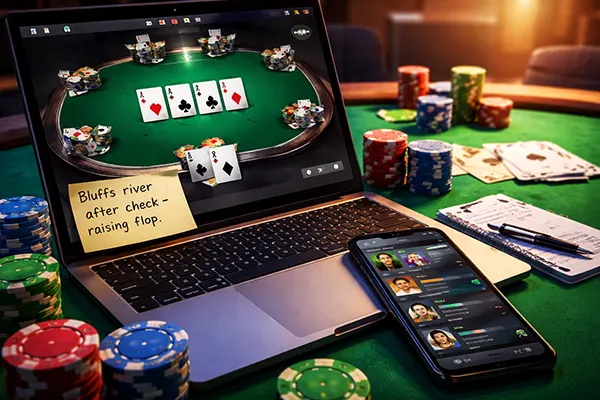
How to Choose the Best Books and Resources for Learning Poker
Poker is a game of skill, strategy, and psychology, and mastering it requires more than just practice. The journey to becoming a proficient player starts with choosing the right resources. Whether you are a complete beginner or someone looking to sharpen advanced strategies, finding the best educational tools is essential. In this article, we’ll delve into how books, online courses, and practical tools can help players at every stage of their poker journey. By leveraging these resources effectively, you can transform your understanding of the game.
The Importance of Books in Poker Education
Books have been a cornerstone of poker education for decades. Unlike fleeting online articles or quick videos, books provide a structured and thorough exploration of poker strategies. They capture the insights of seasoned professionals, offering timeless lessons on various aspects of the game. From understanding poker mathematics to decoding the psychological battles at the table, books remain one of the most reliable sources of learning.
One of the key advantages of poker books is their accessibility. They allow readers to learn at their own pace, making it easier to digest complex concepts over time. Additionally, books can be revisited repeatedly, ensuring that important lessons are reinforced. They also serve as a bridge between theoretical understanding and practical application, preparing players for real-world scenarios.
Key Books for Beginners
For beginners, selecting the right book can make all the difference. A highly recommended starting point is David Sklansky’s “The Theory of Poker.” This classic text lays the groundwork by introducing fundamental concepts such as pot odds, implied odds, and game theory. These principles are essential for understanding decision-making at the poker table.
Another excellent resource is “Harrington on Hold’em” by Dan Harrington. This book is particularly valuable for players looking to excel in No-Limit Texas Hold’em tournaments. It breaks down complex strategies into digestible sections, making it ideal for newcomers. For those interested in cash games, “Small Stakes Hold’em” by Ed Miller is a must-read, as it focuses on exploiting common mistakes made by opponents at lower stakes.
If you prefer a more modern take, consider “Modern Poker Theory” by Michael Acevedo. This book incorporates advanced concepts like Game Theory Optimal (GTO) play, which is increasingly relevant in today’s competitive environment. Beginners who invest time in these books will gain a solid foundation that can be built upon as their skills evolve.
Exploring Online Poker Courses and Tutorials
In the digital age, online courses and tutorials have become invaluable tools for poker education. They combine the best of theoretical and practical learning by offering interactive content, expert guidance, and hands-on exercises. For players who thrive in a more dynamic learning environment, these platforms are indispensable.
Unlike traditional books, online courses often include video lectures, quizzes, and live sessions with professionals. This multimedia approach caters to different learning styles, ensuring that concepts are both understood and retained. Moreover, many platforms allow learners to interact with instructors and fellow students, fostering a sense of community and collaboration.
Some courses are tailored for specific game types, such as Texas Hold’em or Pot-Limit Omaha, while others cover broader topics like bankroll management or tournament strategy. The variety ensures that players can find a course suited to their needs and goals, whether they aim to dominate home games or compete in high-stakes tournaments.
Top Platforms for Online Learning
For comprehensive poker education, consider platforms like Upswing Poker and MasterClass. Upswing Poker offers a wide range of courses taught by renowned professionals, including Doug Polk. Their lessons cover everything from basic hand selection to advanced post-flop strategies, making them suitable for players at all levels.
Another excellent platform is PokerCoaching.com, founded by Jonathan Little. This site provides interactive quizzes, hand reviews, and personalised feedback, helping players identify and address their weaknesses. For those on a budget, YouTube channels like Gripsed Poker Training offer free, high-quality tutorials. These platforms make learning poker accessible, engaging, and effective.

Practical Tools and Resources for Improving Poker Skills
In addition to books and courses, poker players can benefit greatly from practical tools and software. These resources are designed to simulate real-game scenarios, analyse gameplay, and highlight areas for improvement. They enable players to refine their strategies and gain a competitive edge in a rapidly evolving game.
Poker tools come in many forms, from equity calculators to hand analysis software. These tools provide valuable insights that would be difficult to obtain through observation alone. They allow players to review their decisions, understand their mistakes, and experiment with alternative approaches. Whether you’re analysing a single hand or an entire session, the right tools can elevate your game significantly.
Furthermore, apps and software offer convenience. With just a few clicks, you can access detailed statistics, calculate odds, or simulate different scenarios. This instant feedback accelerates the learning process, making it easier to apply theoretical concepts during actual gameplay.
Recommended Software and Apps
Among the most popular tools for serious poker players are PokerTracker and Hold’em Manager. These programs track your hands, compile statistics, and generate reports that help you identify patterns in your play. They are particularly useful for online players looking to gain a statistical edge.
For situational analysis, apps like Flopzilla and SnapShove are highly recommended. Flopzilla allows you to visualise ranges and calculate equity in various scenarios, while SnapShove helps you make optimal shove/fold decisions in tournaments. By integrating these tools into your practice routine, you can enhance both your strategic thinking and decision-making skills.
Finally, don’t overlook the power of poker forums and communities. Websites like TwoPlusTwo and Reddit’s r/poker provide platforms for discussing strategies, sharing insights, and learning from other players. Engaging with these communities can provide valuable perspectives and keep you updated on the latest trends in the game.






